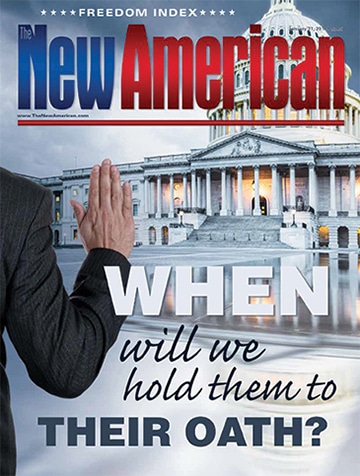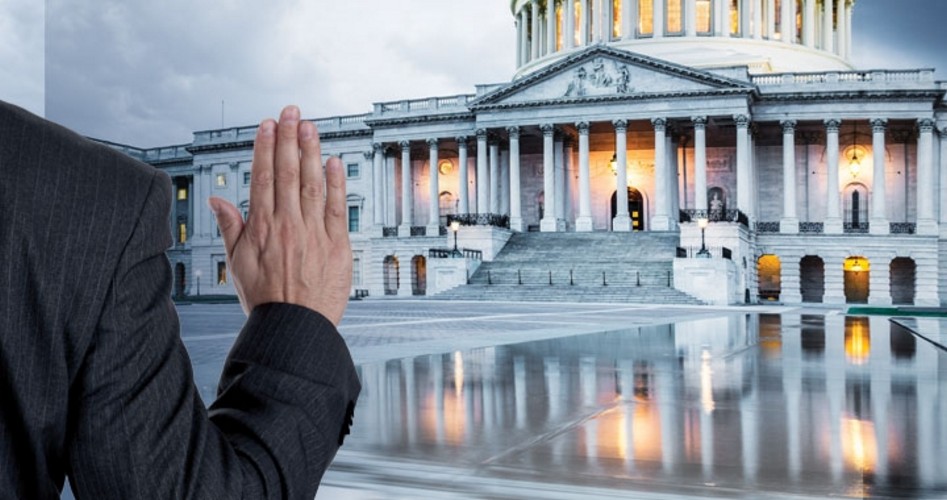When Will We Hold Them to Their Oath?
“Do you swear that you will support and defend the Constitution of the United States against all enemies foreign and domestic; that you will bear true faith and allegiance to the same; that you will take this obligation freely, without any mental reservation or purpose of evasion; and that you will faithfully discharge the duties of the office on which you are about to enter — so help you God?”
Each member of Congress — newly elected or reelected — must solemnly swear allegiance to the above oath at the beginning of each two-year session of Congress. Many do so in robotic fashion, placing as much value on the solemn words of the oath as would an actual robot. Some others possess varying degrees of loyalty to and awareness about the Constitution. But all are encouraged to look to their party’s leaders, not to the document itself, for guidelines about how they should vote on proposed legislation.
In January 1993, during his very first day as a member of Congress, newly elected Congressman Richard Pombo (R-Calif.) somewhat angrily recounted his experience when he stood to swear the oath with his colleagues. He first told of his surge of pride and patriotism as he was about to make the solemn pledge. Immediately, however, he heard a colleague propose granting full congressional voting privileges to the delegates from Guam, the Virgin Islands, American Samoa, Puerto Rico, and the District of Columbia. Each of those areas is a part of the United States, but not a state. The Constitution grants full voting rights only to elected members from “states.” The regions named above are not and never have been states.
Pombo’s colleague who made the proposal said it addressed a matter of “fairness, not constitutionality.” There’s no mention of “fairness” in the oath or in the Constitution itself. But “constitutionality” should be foremost in the considerations of any congressman. The wish to grant full voting privileges to delegates from non-states didn’t get very far. But Pombo admitted to experiencing a rather rude awakening about the lack of respect for the Constitution.
What about today? Do members of Congress honor the Constitution each has solemnly sworn to uphold? Overwhelmingly, the answer is, “No, they don’t.” The Constitution is adhered to selectively, and disobeyed regularly. However, one provision of the document earns unquestioned respect from all in Congress. Appearing in Article I, Section 6, it states, “The Senators and Representatives shall receive a compensation for their services.” No member of Congress ignores that.
Though most American adults are likely aware that congressmen routinely ignore the U.S. Constitution at least some of the time, most likely believe that the Supreme Court has allowed their behavior in order to keep up with the times — the “living document” argument. There are multiple problems with that rationale. First, the Constitution has a list of specifically enumerated powers — stating what Congress may do. The federal government has no unspecified powers. All other powers not specifically listed in the Constitution (in the words of the 10th Amendment) “are reserved to the states, respectively, or the people.” As well, the Supreme Court does not have any lawmaking powers under the Constitution, and any changes to the Constitution must be made via the amendment process, so the Supreme Court can neither add nor change federal powers. Unless a change is made to the Constitution via a constitutional amendment, the Constitution must be interpreted as it would have been at the time it was written. If instead, the federal government is allowed to decide the scope of its powers by redefining the clear language of the Constitution, then the government will usurp the powers and rights of the states and the people, and the American people will essentially have elected dictators who follow a rulebook of their own making. Of course, this is exactly what has been happening.
Even if a sizeable majority of Americans want the federal government to tackle some problem — such as environmental problems or drug crimes — unless a constitutional change is made, violating the Constitution renders it a dead letter, no more than an artifact.
Any breach of the Constitution by our elected representatives represents another step toward the day when our federal government fails to even pay heed to, or reference, our founding document and the rights and protections therein. And we are far along that road: Government surveillance eliminates privacy and property protections; so-called hate-crimes laws undo free-speech protections; civil asset forfeiture brings about “excessive fines,” “unusual punishments,” and the loss of “due process of law”; “gender equity” buries freedom of religion; and anti-gun laws chip away at our right to self-defense.
And congressmen don’t merely make small breaches in the bulwark of the Constitution, they gouge it. To demonstrate the disdain for the venerable document held by most members of Congress, we list 11 key parts of the Constitution regularly ignored, or fraudulently given new meaning. Each portion being violated or ignored still exists in the document and is part of what all members of Congress swear to support. But a majority does not honor the oath and, instead, allows government to expand its power while still claiming adherence to the Constitution. Sadly, most Americans, victims of deficient schooling about the Constitution, do not protest.
We do not claim that what follows covers all deviations from the Constitution’s text and intent. Unfortunately, there are more. But the importance of what follows can be summed up with a claim we have frequently made: America became great, not because of what government did, but because of what government was prevented from doing by the Constitution.
If the Constitution were accorded the importance it deserves, the federal government would be 20 percent its size and 20 percent its cost — and we would have 50 states whose laws more closely align with the mores and the desires of their populaces, a freedom that Americans in general should seek.
1. Article I, Section 1, Sentence 1: “All legislative powers herein granted shall be vested in a Congress of the United States.”
The word “all” leaves no room for exceptions. In this instance, therefore, no government entity, individual, or group has been awarded any lawmaking power except Congress. But commonly employed presidential executive orders have been allowed to assume lawmaking status — which is obviously unconstitutional. Hundreds of executive mandates handed down by presidents over recent years have immediately been elevated to law governing the American people and their endeavors. Obama administration heavyweight Paul Begala summarized the practice when he arrogantly stated, “Stroke of the pen; law of the land; kinda cool.”
The president may issue executive orders that concern only how members of the executive branch function in order to comply with federal law, but he cannot change or make law. If a presidential executive order establishes a law governing the entire nation, the president has overstepped his bounds, and his edict should be disregarded. It’s similar to a corporation president: He certainly has the right to issue an executive order directed at his employees, but he should be in trouble if he issues one aimed at all Americans.
Photo: GettyImagesPlus
This article appears in the January 21, 2019, issue of The New American.


